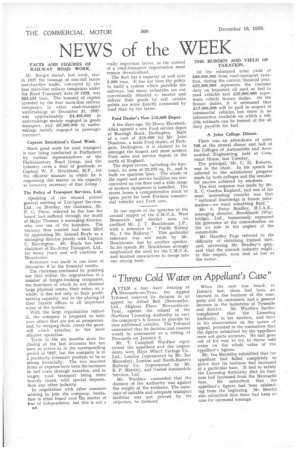NEWS of the WEEK
Page 38

If you've noticed an error in this article please click here to report it so we can fix it.
FACTS AND FIGURES OF RAILWAY ROAD WORK.
Mr. Burgin stated, last week, that in 1937 the tonnage of non-rail borne merchandise traffic, conveyed by the four main-line railway companies under the Road Transport Acts of 1928, was 859,153 tons. The amount of capital invested by the four main-line railway companies in other road-transport undertakings at December 31, 1937, was approximately £4,400,000 in undertakings mainly engaged in goods transport, and £9,300,000 in undertakings mainly engaged in passenger transport.
Captain Strickland's Good Work.
Much good work for road transport is now being conducted in Parliament by various representatives of the Parliamentary Road Group, and the industry owes a debt of gratitude to Captain W. F. Strickland, M.P., for the efficient manner in which he is organizing this matter in his capacity as honorary secretary of that Group.
The Policy of Transport Services, Ltd.
Speaking at the second annual general meeting of Tratz sport Services, Ltd., on Monday, the chairman,, Mr. P. G. Dunn, referred to the loss the board had suffered through the death of Major Thomas, a managing director, who was one of the founders, The vacancy thus created had been filled by appointing Mr. Samuel Royle as a managing director jointly with Captain C. Barrington. Mr. Royle has been chairman of Ex-Army Transport, Ltd., for many years and will continue at Manchester.
Reference was made in our issue of December 9 to the financial results.
The chairman continued by pointing Out that within the organization is a number of freight-broking companies, the functions of which do not demand large physical assets; their value, as a whole, is due not only to their profitearning capacity, but to the placing of their branch offices in all important areas of the system.
With the large organization behind it, the company is prepared to take over others that are not so prosperous, and, by merging them, create the goodwill which attaches to the most efficient operation.
Trade in the six months since the closing of the last accounts has not been so active as in the corresponding period of 1937, but the company is in a peculiarly fortunate position to be so strong financially. The two heaviest items of expense have been the increases in fuel costs through taxation, and in wages, road transport being more heavily taxed, with special imposts, than any other industry.
In negotiation with other concerns wishing to join the company, hesitation is often found over the matter of loss of independence, but this is not a 34 really important factor, as the control of a road-transport organization must remain decentralized.
The fleet has a capacity of well over 3,000 tons. It has not been the policy to build a system which parallels the railways, but many industries are not conveniently situated to receive and deliver their goods by rail; certain points are more directly connected by road than by the latter.
Ford Dealer's New £10,000 Depot.
A few days ago, Sir Henry HavelockAllan opened a new Ford service depot at Borough Road, Darlington. Built at a cost of £10,000 for Mr. John Neasham, a main Ford dealer, of Parkgate, Darlington, it is claimed to be amongst the largest and most modern Ford sales and service depots in the north of England.
The depot covers, including the forecourt, an area of 22,275 sq. ft., and is built on spacious lines. The whole of the repair and service facilities are concentrated on one floor and a wide range of modern equipment is installed. The stores house a comprehensive stock of spare parts for both Fordson commercial vehicles and Ford cars.
In our report of the speeches at the annual supper of the C.M.U.A. West Bromwich and district area, we credited Mr. J. T. Brockhouse, J.P., with a reference to " Public Enemy No. 1 the Railway." This particular reference was not made by Mr. Brockhouse, but by another speaker. In his speech Mr. Brockhouse strongly emphasized the need for the C.M.U.A. and kindred associations to merge into one strong body.
THE BURDEN AND YIELD OF TAXATION.
Of the estimated total yield of £88,000,000 from road-transport taxation, during the current financial year, £52,000,000 represents the customs duty on imported oil used as fuel in road vehicles and £36,000,000 represents vehicle licence duties. Of the licence duties, it is estimated that £17,000,000 will be paid in respect of commercial vehicles, but there is no information available on which a reliable estimate can be formed of the oil duty payable for fuel.
A Joint College Dinner.
There was an attendance of some 700 at the annual dinner and ball of the Colleges of Automobile and Aeronautical Engineering, held at Grosvenor House, last Tuesday.
The principal, Mr. C. H. Roberts, was in the chair. In his speech he referred to the satisfactory progress made by both colleges and the wonderful success achieved by students.
The first response was made by Mr. E. C. Gordon England, and one of his most interesting remarks was that " technical knowledge is frozen information—we want something fluid."
Mr. A. Percy Bradley, M.I.A.E., managing director, Brooklands (Weybridge), Ltd., humorously expressed his grievance at the concentration on the air side to the neglect of the automobile.
Mr. Handley Page referred to the difficulty of obtaining trained men, and, answering Mr. Bradley's quip, said that the aircraft industry might, in this respect, soon sink as low as the motor.




























































































